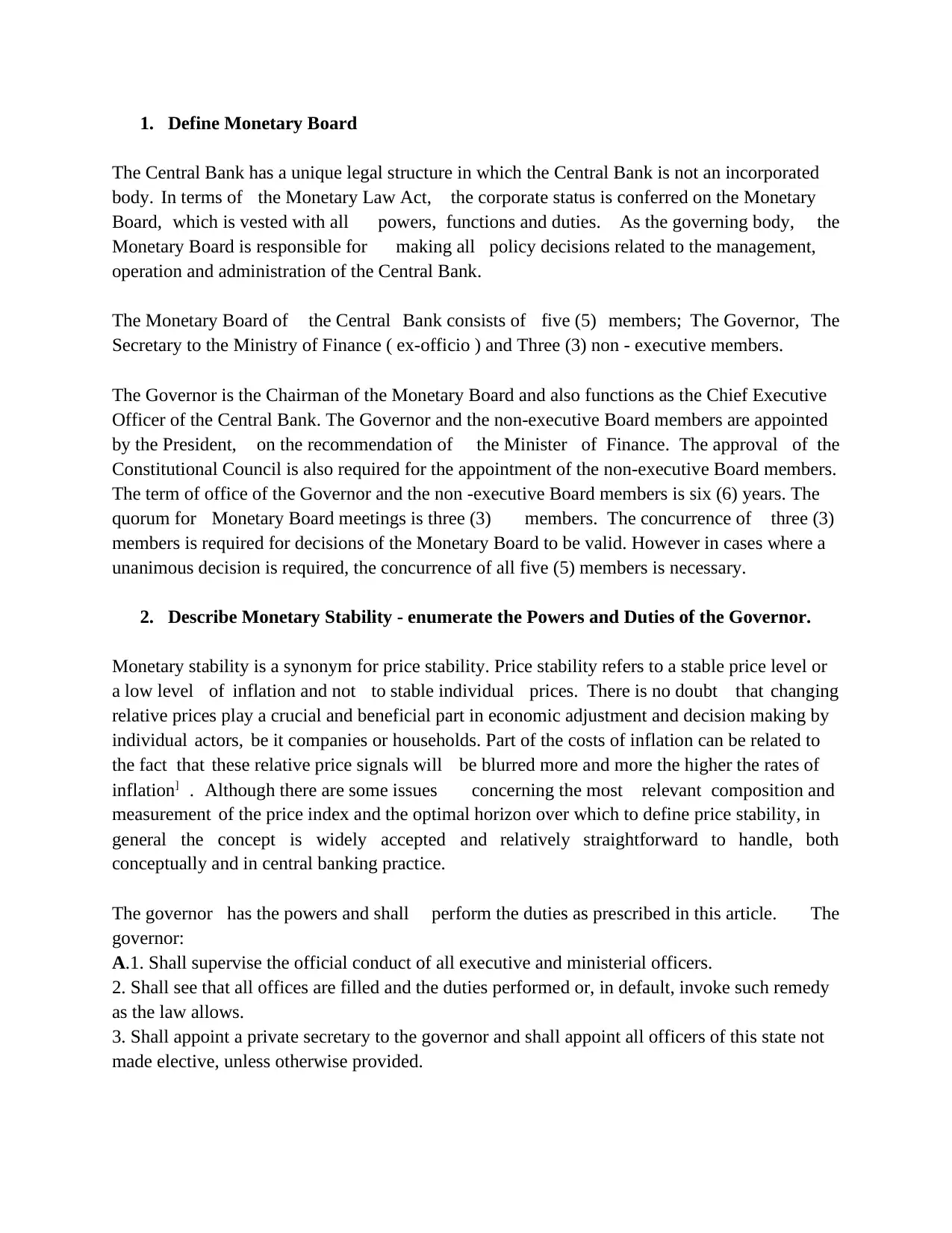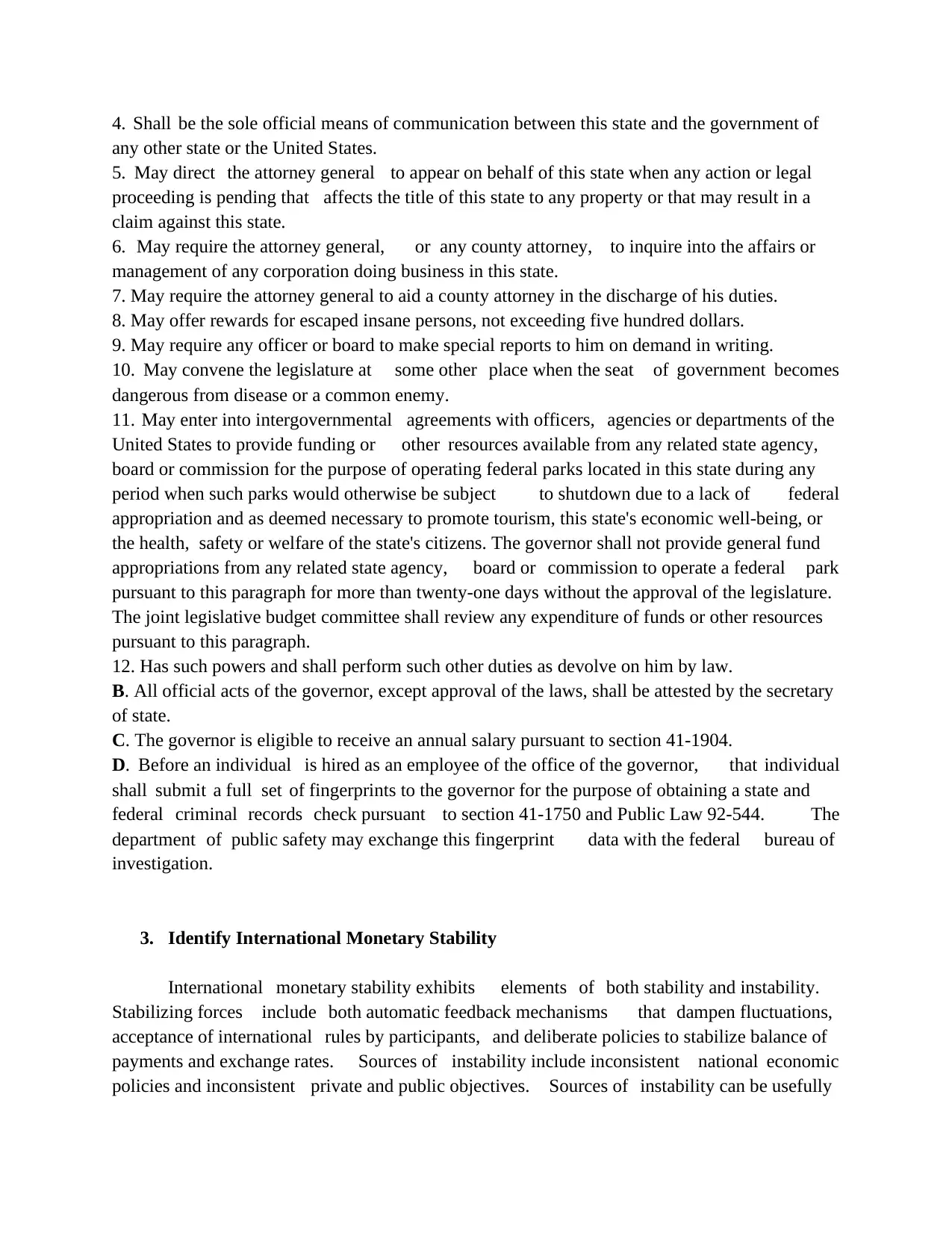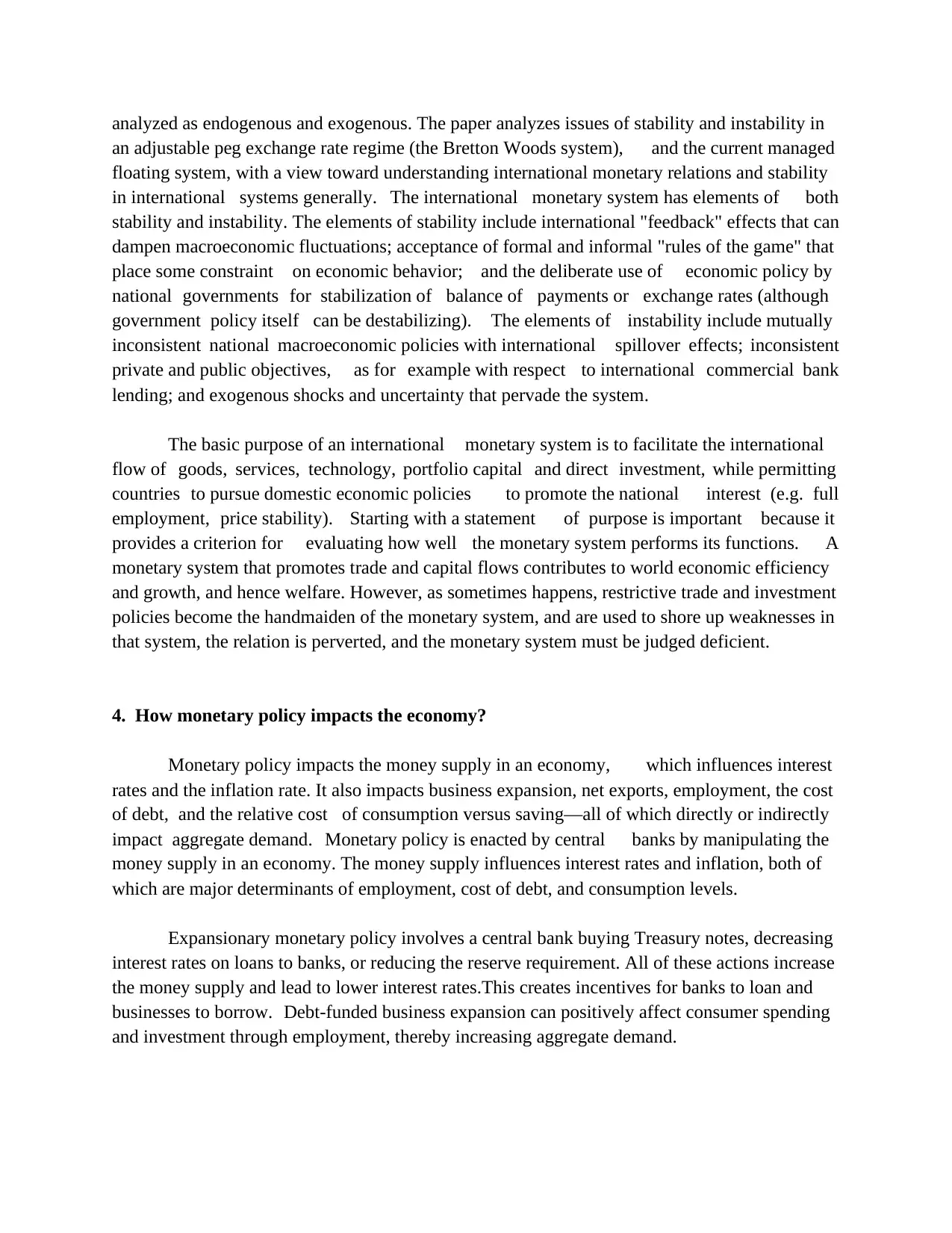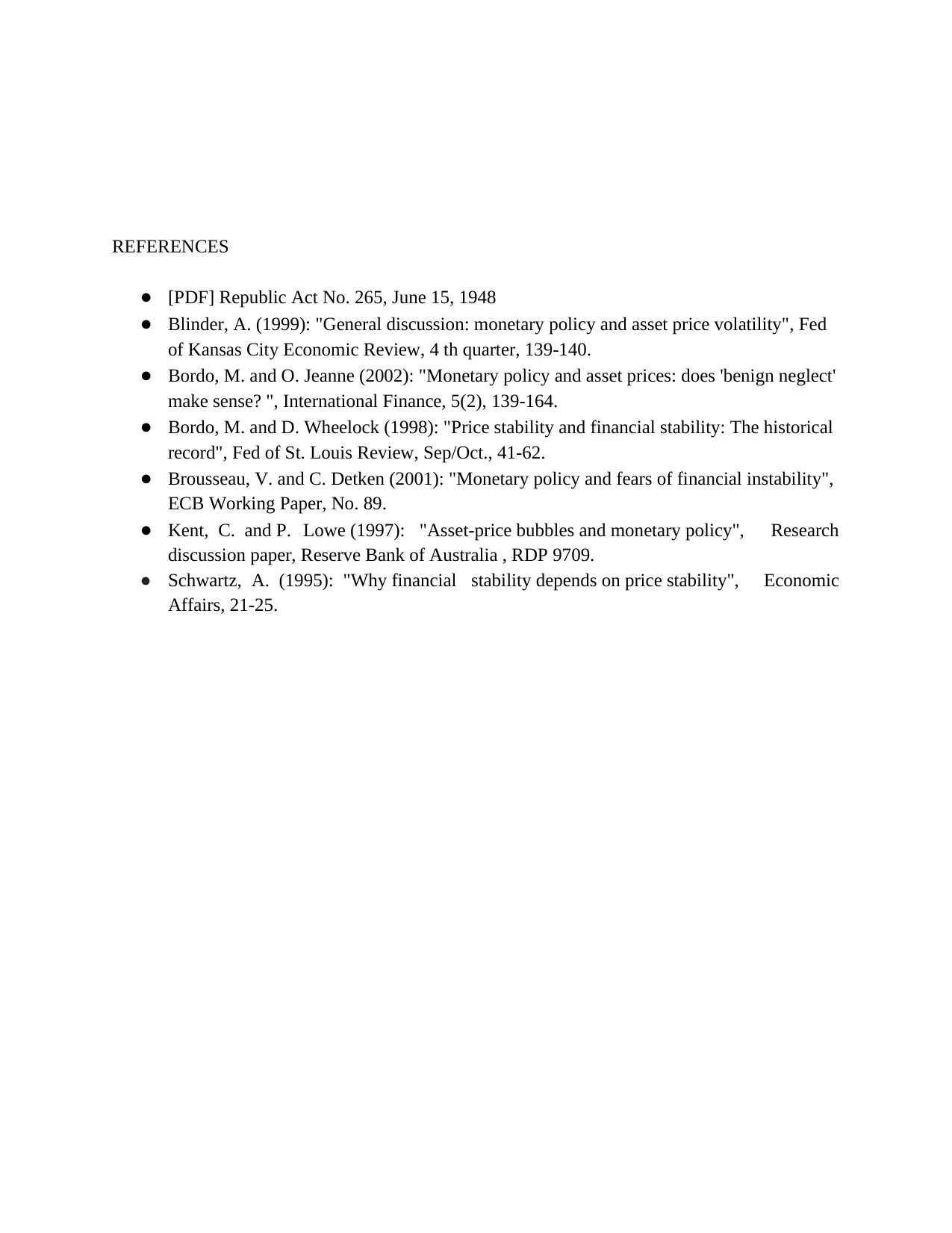Comprehensive Analysis: Monetary Board, Stability, and Economic Policy
VerifiedAdded on 2022/03/02
|4
|1683
|50
Report
AI Summary
This report delves into the intricacies of monetary policy, beginning with a definition of the Monetary Board and its responsibilities as the governing body of the Central Bank, outlining its composition and decision-making processes. It then explores monetary stability, equating it with price stability and discussing the powers and duties of the Governor. The report further examines international monetary stability, highlighting both stabilizing and destabilizing forces within the international monetary system. Finally, it analyzes how monetary policy impacts the economy, focusing on its influence on the money supply, interest rates, inflation, business expansion, and overall aggregate demand. The report references several academic sources to support its analysis, providing a comprehensive overview of monetary policy's role in economic management.

1. Define Monetary Board
The Central Bank has a unique legal structure in which the Central Bank is not an incorporated
body. In terms of the Monetary Law Act, the corporate status is conferred on the Monetary
Board, which is vested with all powers, functions and duties. As the governing body, the
Monetary Board is responsible for making all policy decisions related to the management,
operation and administration of the Central Bank.
The Monetary Board of the Central Bank consists of five (5) members; The Governor, The
Secretary to the Ministry of Finance ( ex-officio ) and Three (3) non - executive members.
The Governor is the Chairman of the Monetary Board and also functions as the Chief Executive
Officer of the Central Bank. The Governor and the non-executive Board members are appointed
by the President, on the recommendation of the Minister of Finance. The approval of the
Constitutional Council is also required for the appointment of the non-executive Board members.
The term of office of the Governor and the non -executive Board members is six (6) years. The
quorum for Monetary Board meetings is three (3) members. The concurrence of three (3)
members is required for decisions of the Monetary Board to be valid. However in cases where a
unanimous decision is required, the concurrence of all five (5) members is necessary.
2. Describe Monetary Stability - enumerate the Powers and Duties of the Governor.
Monetary stability is a synonym for price stability. Price stability refers to a stable price level or
a low level of inflation and not to stable individual prices. There is no doubt that changing
relative prices play a crucial and beneficial part in economic adjustment and decision making by
individual actors, be it companies or households. Part of the costs of inflation can be related to
the fact that these relative price signals will be blurred more and more the higher the rates of
inflation] . Although there are some issues concerning the most relevant composition and
measurement of the price index and the optimal horizon over which to define price stability, in
general the concept is widely accepted and relatively straightforward to handle, both
conceptually and in central banking practice.
The governor has the powers and shall perform the duties as prescribed in this article. The
governor:
A.1. Shall supervise the official conduct of all executive and ministerial officers.
2. Shall see that all offices are filled and the duties performed or, in default, invoke such remedy
as the law allows.
3. Shall appoint a private secretary to the governor and shall appoint all officers of this state not
made elective, unless otherwise provided.
The Central Bank has a unique legal structure in which the Central Bank is not an incorporated
body. In terms of the Monetary Law Act, the corporate status is conferred on the Monetary
Board, which is vested with all powers, functions and duties. As the governing body, the
Monetary Board is responsible for making all policy decisions related to the management,
operation and administration of the Central Bank.
The Monetary Board of the Central Bank consists of five (5) members; The Governor, The
Secretary to the Ministry of Finance ( ex-officio ) and Three (3) non - executive members.
The Governor is the Chairman of the Monetary Board and also functions as the Chief Executive
Officer of the Central Bank. The Governor and the non-executive Board members are appointed
by the President, on the recommendation of the Minister of Finance. The approval of the
Constitutional Council is also required for the appointment of the non-executive Board members.
The term of office of the Governor and the non -executive Board members is six (6) years. The
quorum for Monetary Board meetings is three (3) members. The concurrence of three (3)
members is required for decisions of the Monetary Board to be valid. However in cases where a
unanimous decision is required, the concurrence of all five (5) members is necessary.
2. Describe Monetary Stability - enumerate the Powers and Duties of the Governor.
Monetary stability is a synonym for price stability. Price stability refers to a stable price level or
a low level of inflation and not to stable individual prices. There is no doubt that changing
relative prices play a crucial and beneficial part in economic adjustment and decision making by
individual actors, be it companies or households. Part of the costs of inflation can be related to
the fact that these relative price signals will be blurred more and more the higher the rates of
inflation] . Although there are some issues concerning the most relevant composition and
measurement of the price index and the optimal horizon over which to define price stability, in
general the concept is widely accepted and relatively straightforward to handle, both
conceptually and in central banking practice.
The governor has the powers and shall perform the duties as prescribed in this article. The
governor:
A.1. Shall supervise the official conduct of all executive and ministerial officers.
2. Shall see that all offices are filled and the duties performed or, in default, invoke such remedy
as the law allows.
3. Shall appoint a private secretary to the governor and shall appoint all officers of this state not
made elective, unless otherwise provided.
Paraphrase This Document
Need a fresh take? Get an instant paraphrase of this document with our AI Paraphraser

4. Shall be the sole official means of communication between this state and the government of
any other state or the United States.
5. May direct the attorney general to appear on behalf of this state when any action or legal
proceeding is pending that affects the title of this state to any property or that may result in a
claim against this state.
6. May require the attorney general, or any county attorney, to inquire into the affairs or
management of any corporation doing business in this state.
7. May require the attorney general to aid a county attorney in the discharge of his duties.
8. May offer rewards for escaped insane persons, not exceeding five hundred dollars.
9. May require any officer or board to make special reports to him on demand in writing.
10. May convene the legislature at some other place when the seat of government becomes
dangerous from disease or a common enemy.
11. May enter into intergovernmental agreements with officers, agencies or departments of the
United States to provide funding or other resources available from any related state agency,
board or commission for the purpose of operating federal parks located in this state during any
period when such parks would otherwise be subject to shutdown due to a lack of federal
appropriation and as deemed necessary to promote tourism, this state's economic well-being, or
the health, safety or welfare of the state's citizens. The governor shall not provide general fund
appropriations from any related state agency, board or commission to operate a federal park
pursuant to this paragraph for more than twenty-one days without the approval of the legislature.
The joint legislative budget committee shall review any expenditure of funds or other resources
pursuant to this paragraph.
12. Has such powers and shall perform such other duties as devolve on him by law.
B. All official acts of the governor, except approval of the laws, shall be attested by the secretary
of state.
C. The governor is eligible to receive an annual salary pursuant to section 41-1904.
D. Before an individual is hired as an employee of the office of the governor, that individual
shall submit a full set of fingerprints to the governor for the purpose of obtaining a state and
federal criminal records check pursuant to section 41-1750 and Public Law 92-544. The
department of public safety may exchange this fingerprint data with the federal bureau of
investigation.
3. Identify International Monetary Stability
International monetary stability exhibits elements of both stability and instability.
Stabilizing forces include both automatic feedback mechanisms that dampen fluctuations,
acceptance of international rules by participants, and deliberate policies to stabilize balance of
payments and exchange rates. Sources of instability include inconsistent national economic
policies and inconsistent private and public objectives. Sources of instability can be usefully
any other state or the United States.
5. May direct the attorney general to appear on behalf of this state when any action or legal
proceeding is pending that affects the title of this state to any property or that may result in a
claim against this state.
6. May require the attorney general, or any county attorney, to inquire into the affairs or
management of any corporation doing business in this state.
7. May require the attorney general to aid a county attorney in the discharge of his duties.
8. May offer rewards for escaped insane persons, not exceeding five hundred dollars.
9. May require any officer or board to make special reports to him on demand in writing.
10. May convene the legislature at some other place when the seat of government becomes
dangerous from disease or a common enemy.
11. May enter into intergovernmental agreements with officers, agencies or departments of the
United States to provide funding or other resources available from any related state agency,
board or commission for the purpose of operating federal parks located in this state during any
period when such parks would otherwise be subject to shutdown due to a lack of federal
appropriation and as deemed necessary to promote tourism, this state's economic well-being, or
the health, safety or welfare of the state's citizens. The governor shall not provide general fund
appropriations from any related state agency, board or commission to operate a federal park
pursuant to this paragraph for more than twenty-one days without the approval of the legislature.
The joint legislative budget committee shall review any expenditure of funds or other resources
pursuant to this paragraph.
12. Has such powers and shall perform such other duties as devolve on him by law.
B. All official acts of the governor, except approval of the laws, shall be attested by the secretary
of state.
C. The governor is eligible to receive an annual salary pursuant to section 41-1904.
D. Before an individual is hired as an employee of the office of the governor, that individual
shall submit a full set of fingerprints to the governor for the purpose of obtaining a state and
federal criminal records check pursuant to section 41-1750 and Public Law 92-544. The
department of public safety may exchange this fingerprint data with the federal bureau of
investigation.
3. Identify International Monetary Stability
International monetary stability exhibits elements of both stability and instability.
Stabilizing forces include both automatic feedback mechanisms that dampen fluctuations,
acceptance of international rules by participants, and deliberate policies to stabilize balance of
payments and exchange rates. Sources of instability include inconsistent national economic
policies and inconsistent private and public objectives. Sources of instability can be usefully

analyzed as endogenous and exogenous. The paper analyzes issues of stability and instability in
an adjustable peg exchange rate regime (the Bretton Woods system), and the current managed
floating system, with a view toward understanding international monetary relations and stability
in international systems generally. The international monetary system has elements of both
stability and instability. The elements of stability include international "feedback" effects that can
dampen macroeconomic fluctuations; acceptance of formal and informal "rules of the game" that
place some constraint on economic behavior; and the deliberate use of economic policy by
national governments for stabilization of balance of payments or exchange rates (although
government policy itself can be destabilizing). The elements of instability include mutually
inconsistent national macroeconomic policies with international spillover effects; inconsistent
private and public objectives, as for example with respect to international commercial bank
lending; and exogenous shocks and uncertainty that pervade the system.
The basic purpose of an international monetary system is to facilitate the international
flow of goods, services, technology, portfolio capital and direct investment, while permitting
countries to pursue domestic economic policies to promote the national interest (e.g. full
employment, price stability). Starting with a statement of purpose is important because it
provides a criterion for evaluating how well the monetary system performs its functions. A
monetary system that promotes trade and capital flows contributes to world economic efficiency
and growth, and hence welfare. However, as sometimes happens, restrictive trade and investment
policies become the handmaiden of the monetary system, and are used to shore up weaknesses in
that system, the relation is perverted, and the monetary system must be judged deficient.
4. How monetary policy impacts the economy?
Monetary policy impacts the money supply in an economy, which influences interest
rates and the inflation rate. It also impacts business expansion, net exports, employment, the cost
of debt, and the relative cost of consumption versus saving—all of which directly or indirectly
impact aggregate demand. Monetary policy is enacted by central banks by manipulating the
money supply in an economy. The money supply influences interest rates and inflation, both of
which are major determinants of employment, cost of debt, and consumption levels.
Expansionary monetary policy involves a central bank buying Treasury notes, decreasing
interest rates on loans to banks, or reducing the reserve requirement. All of these actions increase
the money supply and lead to lower interest rates.This creates incentives for banks to loan and
businesses to borrow. Debt-funded business expansion can positively affect consumer spending
and investment through employment, thereby increasing aggregate demand.
an adjustable peg exchange rate regime (the Bretton Woods system), and the current managed
floating system, with a view toward understanding international monetary relations and stability
in international systems generally. The international monetary system has elements of both
stability and instability. The elements of stability include international "feedback" effects that can
dampen macroeconomic fluctuations; acceptance of formal and informal "rules of the game" that
place some constraint on economic behavior; and the deliberate use of economic policy by
national governments for stabilization of balance of payments or exchange rates (although
government policy itself can be destabilizing). The elements of instability include mutually
inconsistent national macroeconomic policies with international spillover effects; inconsistent
private and public objectives, as for example with respect to international commercial bank
lending; and exogenous shocks and uncertainty that pervade the system.
The basic purpose of an international monetary system is to facilitate the international
flow of goods, services, technology, portfolio capital and direct investment, while permitting
countries to pursue domestic economic policies to promote the national interest (e.g. full
employment, price stability). Starting with a statement of purpose is important because it
provides a criterion for evaluating how well the monetary system performs its functions. A
monetary system that promotes trade and capital flows contributes to world economic efficiency
and growth, and hence welfare. However, as sometimes happens, restrictive trade and investment
policies become the handmaiden of the monetary system, and are used to shore up weaknesses in
that system, the relation is perverted, and the monetary system must be judged deficient.
4. How monetary policy impacts the economy?
Monetary policy impacts the money supply in an economy, which influences interest
rates and the inflation rate. It also impacts business expansion, net exports, employment, the cost
of debt, and the relative cost of consumption versus saving—all of which directly or indirectly
impact aggregate demand. Monetary policy is enacted by central banks by manipulating the
money supply in an economy. The money supply influences interest rates and inflation, both of
which are major determinants of employment, cost of debt, and consumption levels.
Expansionary monetary policy involves a central bank buying Treasury notes, decreasing
interest rates on loans to banks, or reducing the reserve requirement. All of these actions increase
the money supply and lead to lower interest rates.This creates incentives for banks to loan and
businesses to borrow. Debt-funded business expansion can positively affect consumer spending
and investment through employment, thereby increasing aggregate demand.
⊘ This is a preview!⊘
Do you want full access?
Subscribe today to unlock all pages.

Trusted by 1+ million students worldwide

REFERENCES
● [PDF] Republic Act No. 265, June 15, 1948
● Blinder, A. (1999): "General discussion: monetary policy and asset price volatility", Fed
of Kansas City Economic Review, 4 th quarter, 139-140.
● Bordo, M. and O. Jeanne (2002): "Monetary policy and asset prices: does 'benign neglect'
make sense? ", International Finance, 5(2), 139-164.
● Bordo, M. and D. Wheelock (1998): "Price stability and financial stability: The historical
record", Fed of St. Louis Review, Sep/Oct., 41-62.
● Brousseau, V. and C. Detken (2001): "Monetary policy and fears of financial instability",
ECB Working Paper, No. 89.
● Kent, C. and P. Lowe (1997): "Asset-price bubbles and monetary policy", Research
discussion paper, Reserve Bank of Australia , RDP 9709.
● Schwartz, A. (1995): "Why financial stability depends on price stability", Economic
Affairs, 21-25.
● [PDF] Republic Act No. 265, June 15, 1948
● Blinder, A. (1999): "General discussion: monetary policy and asset price volatility", Fed
of Kansas City Economic Review, 4 th quarter, 139-140.
● Bordo, M. and O. Jeanne (2002): "Monetary policy and asset prices: does 'benign neglect'
make sense? ", International Finance, 5(2), 139-164.
● Bordo, M. and D. Wheelock (1998): "Price stability and financial stability: The historical
record", Fed of St. Louis Review, Sep/Oct., 41-62.
● Brousseau, V. and C. Detken (2001): "Monetary policy and fears of financial instability",
ECB Working Paper, No. 89.
● Kent, C. and P. Lowe (1997): "Asset-price bubbles and monetary policy", Research
discussion paper, Reserve Bank of Australia , RDP 9709.
● Schwartz, A. (1995): "Why financial stability depends on price stability", Economic
Affairs, 21-25.
1 out of 4
Related Documents
Your All-in-One AI-Powered Toolkit for Academic Success.
+13062052269
info@desklib.com
Available 24*7 on WhatsApp / Email
![[object Object]](/_next/static/media/star-bottom.7253800d.svg)
Unlock your academic potential
Copyright © 2020–2025 A2Z Services. All Rights Reserved. Developed and managed by ZUCOL.




